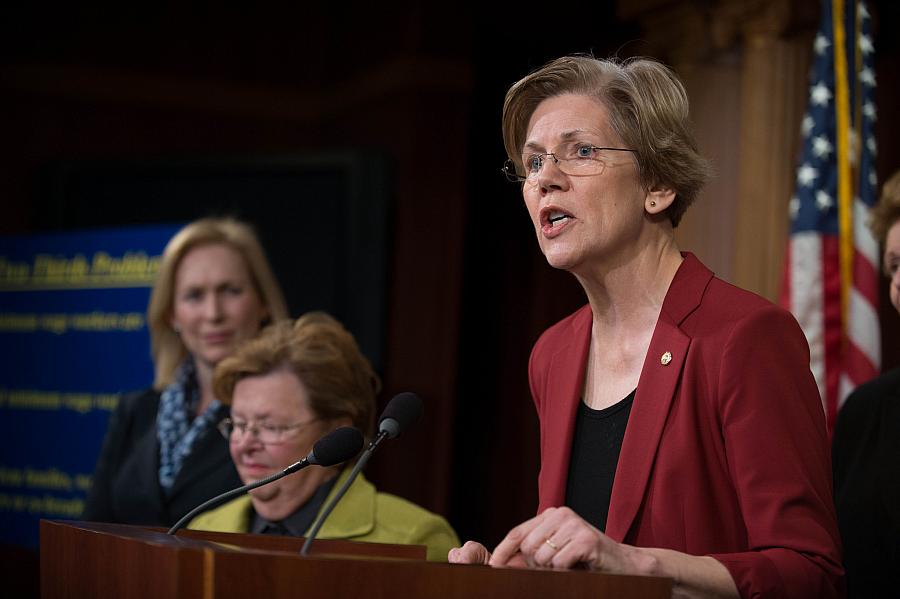Herd Immunity: When will the U.S. Senate take patient safety seriously?

Sen. Elizabeth Warren, shown at an event earlier this year.
What if you held a hearing on patient safety with some of the most powerful members of the U.S. Senate, but hardly any senators showed up?
This is what the country's top patient-safety advocates found when they went to address U.S. senators in July on creating new rules to make health care less deadly. The hearing bore a horror-show headline: “More Than 1,000 Preventable Deaths a Day Is Too Many: The Need to Improve Patient Safety.”
The U.S. Senate Committee on Health, Education, Labor and Pensions called the hearing and asked some great people to attend, including:
- John James, Ph.D., founder of Patient Safety America
- Dr. Ashish Jha, professor of health policy and management, Harvard School of Public Health
- Dr. Tejal Gandhi, president of the National Patient Safety Foundation; associate professor of medicine, Harvard Medical School
- Dr. Peter Pronovost, director of the Armstrong Institute for Patient Safety and Quality, Johns Hopkins Medicine
- Dr. Joanne Disch, professor ad honorem, University of Minnesota School of Nursing
- Lisa McGiffert, director of the Safe Patient Project at Consumers Union
That’s six people testifying. How many of the committee’s 22 members were there to hear that testimony? Only three: Sen. Bernie Sanders (I-Vermont), Sen. Sheldon Whitehouse (D-Rhode Island), and Sen. Elizabeth Warren (D-Massachusetts).
And those three deserve a ton of credit. Sanders, Whitehouse, and, especially, Warren were quite engaged for the full 90-minute meeting. And there were some stomach-churning stories shared.
James, for example, talked about losing his son, Alex, after a series of entirely preventable medical oversights. Alex was a 19-year-old junior at Baylor University when he collapsed while running. He underwent multiple tests and was seen by multiple doctors at two hospitals. Ultimately, he was told that everything was back to normal, and so he went back to running. Two weeks later, he again collapsed while running, fell into a coma and died.
James did what everyone should do when someone dies under suspicious circumstances. He asked for his son’s medical records. Digging through them, he was able to piece together a compelling story about how his son could easily have been saved, and even how his own advice to Alex’s physicians had been ignored. James testified:
In fact, as I deduced much later, at least three catastrophic errors were made by his doctors: (1) they failed to apply a guideline from the National Council on Potassium in Clinical Practice, calling for potassium replacement if heart arrhythmias are present, (2) they failed to diagnose acquired long QT syndrome, and (3) they knew he should not return to running, wrote this in his medical record, but never warned him not to run; Alex’s only discharge instructions were not to drive for 24 hours.
Nearly as astonishing as stories like this were some of the numbers in the testimony. Pronovost talked about how expensive medical errors are, to the government and to you and me. He testified:
Medicine today squanders a third of every dollar spent on therapies that do not get patients well, that result from treating preventable complications, and that result from administrative inefficiencies and fraud. This is about $9,000 per U.S. household, money that could be better spent on preschool education and STEM [Science, Technology, Engineering and Mathematics], on innovation, and on securing a better tomorrow for all Americans.
Wouldn’t this kind of information be important for senators to hear? And yet 19 of the 22 committee members did not bother to show up. The no-shows included some of the biggest names and most influential members of the Senate: Tom Harkin (D-Iowa), Barbara Mikulski (D-Maryland), Kay Hagan (D-North Carolina), Al Franken (D-Minnesota), Lamar Alexander (R-Tennessee), Michael Enzi (R-Wyoming), and Rand Paul (R-Kentucky). You can find the full list here.
If you see someone you voted for on it, send that senator a note or call their office (their local offices almost always take calls). What should you tell them? You can start with some of the great ideas that were shared in the hearing they missed. I’ll write about a few in my next post.
Photo by Senate Democrats via Flickr.

